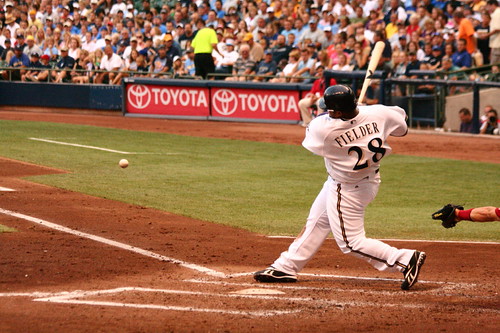 |
| Prince Fielder (photo by Steve Paluch, Flickr) |
With that said, it dawned on me this week why the Mariners are not going to sign Prince Fielder.
The reason is as simple as a 73-page aluminum-plated binder. Scott Boras always makes "educational" binders for his top clients when they hit free agency, and Prince Fielder was far from an exception. Boras handed Fielder's binder out to several different folks in baseball, but in my estimation, the book is really directed at owners.
Here's the deal: MLB front offices put their own price tags on all players. They find a way to calculate how much money they are willing to pay in posting fees for Japanese players. They are certainly more than capable of sticking a price tag on a premier free agent. I highly doubt that anything Scott Boras points out in a shiny binder would significantly alter a front office's assessment of a player.
The same cannot be said of owners. They care about the on-field product, but sports is a big business now. Owners become owners by making lots of money, and making lots of money tends to involve business sense. Scott Boras understands this, and understands that the way to unlock a team's deepest pockets is through wooing its owner. The argument for big bucks is built upon a player's value as an asset to the franchise, which encompasses more than production on the field. It includes a player's "it" factor, generated quite a bit by talent, but also by career milestones, personality, marketing potential, etc.
That's how Scott Boras comes up with 73 pages about Prince Fielder. That's also why the Mariners are an unlikely fit.
Who would be wooed in the Mariners leadership? The owner is in Japan. Howard Lincoln is CEO, and acts to a degree like the team's owner...but he still is not. Hiroshi Yamauchi is, and he lives in Japan, and has never even seen the Mariners play (though perhaps that changes this spring when the M's open up the season in Japan).
That's worth re-stating. The Mariners owner has never even seen the team play.
I don't think any front office in baseball will negotiate the deal that Scott Boras seeks for Prince Fielder. They might technically, but I would be surprised if the contract does not at least include a strong nudge or endorsement from ownership.
As a mildly related aside, the ownership issue is why the Cubs were never a Fielder candidate once Theo Epstein was hired. Cubs owner Tom Ricketts had to give Theo Epstein total control of baseball operations, especially right out of the gate, to get him. Epstein came out and said he would make the Cubs a "scouting and player development machine." Clearly, Theo was not going to spend an exorbitant amount on Fielder, and Ricketts was not going to influence Epstein either. Much like the Mariners, the Cubs were a great fit for Fielder on the diamond, but a bad fit off of it.
For the Mariners, the nudge to sign Fielder clearly would not come from their owner. It would have to come from Howard Lincoln, or maybe Chuck Armstrong.
However, even if Lincoln wants the Mariners to sign Fielder, would he have enough of an urge to talk to both Zduriencik and Yamauchi? Would Lincoln be persuasive enough from his position to make the deal happen? Those are honest questions; I do not know what the dynamic is like between Lincoln and the rest of the Mariners leadership.
Still, my gut feeling is that whatever conversations the Mariners are having about Fielder do not look like the kind of conversations Scott Boras wants to generate. Boras has a knack for making teams feel like they need his top clients. Zduriencik never feels that he absolutely needs any player, and it is hard to envision anyone above Zduriencik in the M's front office feeling strongly about any individual player not already on the team.
So, where would the push for 8 years and $200 million (or whatever) come from in the M's leadership?
On the field, the M's and Prince Fielder are a natural fit. Off the field, they are an awkward one. The last time I checked, contracts are not signed at first base.
No comments:
Post a Comment